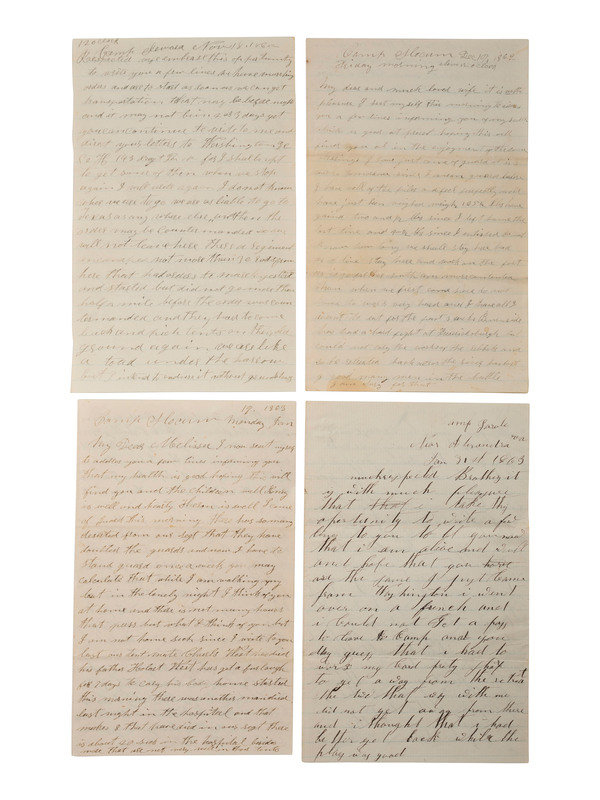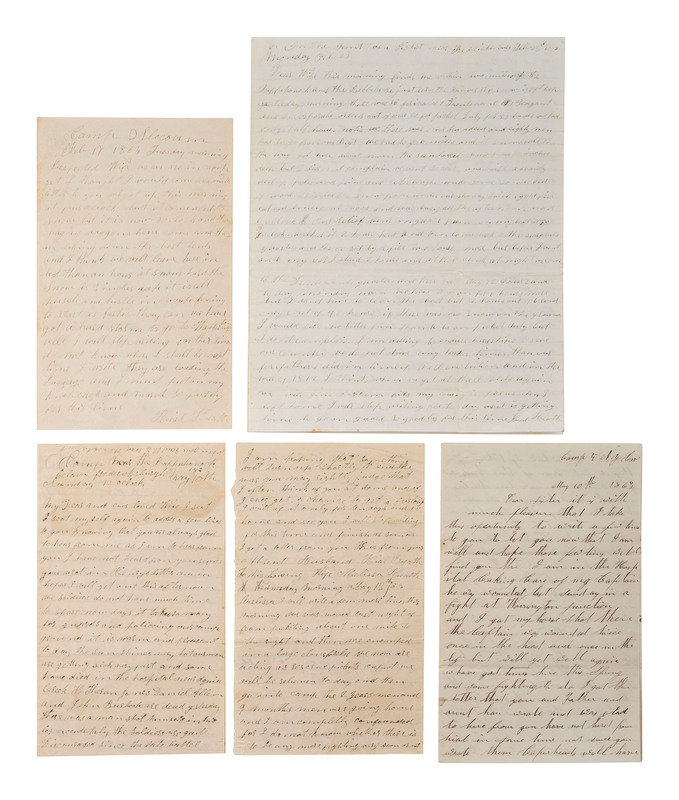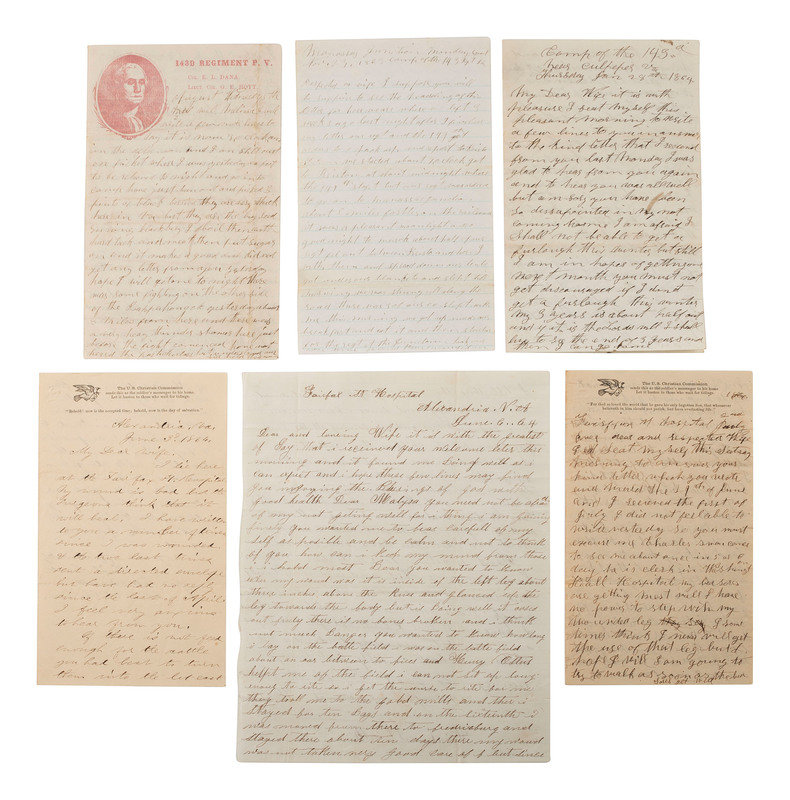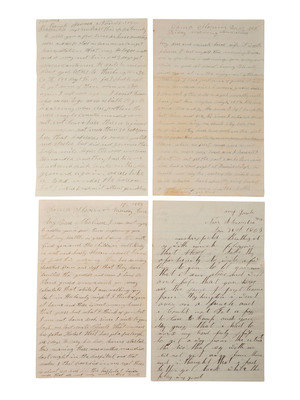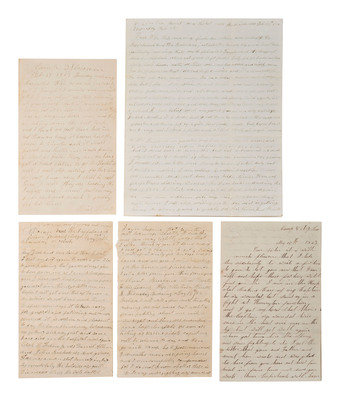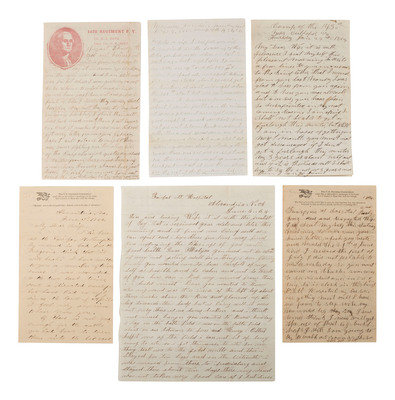Lot 137
[CIVIL WAR]. Archive of correspondence from Private Hial Heath, Co. H, 143rd Pennsylvania Volunteers, DOW Wilderness, and his brother-in-law, Sergeant Newell W. Barnum, Co. G, 5th New York Cavalry, POW Culpeper.
Sale 1192 - American Historical Ephemera & Photography
Lots 1-294
Jun 15, 2023
10:00AM ET
Lots 295-567
Jun 16, 2023
10:00AM ET
Live / Cincinnati
Own a similar item?
Estimate
$5,000 -
7,000
Lot Description
[CIVIL WAR]. Archive of correspondence from Private Hial Heath, Co. H, 143rd Pennsylvania Volunteers, DOW Wilderness, and his brother-in-law, Sergeant Newell W. Barnum, Co. G, 5th New York Cavalry, POW Culpeper.
Archive of approximately 84 letters spanning September 1862 through July 1864, most approx. 4pp+, pen and ink, all but 7 written by Private Hial Heath (1825-1864), Co. H, 143rd Pennsylvania regiment. Remaining letters written by his brother-in-law Sergeant Newell W. Barnum (1837-1915), Co. G, 5th New York Cavalry, brother--in-law Henry Clay Barnum (1843-1863), Co. H, 143rd Pennsylvania, and civilians and clergy attending to Heath following his wounding at the Battle of Wilderness. Majority of correspondence addressed to Heath's wife, Melissa Barnum Heath (1835-1922). Condition of letters generally good, with expected toning, folds, and light soil. Some letters faint, but legible. All documents housed in a 4 in. binder with accompanying transcriptions.
The 143rd Pennsylvania was organized in late summer 1862 at Wilkes-Barre, Pennsylvania, under Colonel Edmund L. Dana. Heath, who is incorrectly identified in some Civil War records as "Hill Heath," enlisted on 9/17/1862 as a private and mustered into Co. H, a regiment from Susquehanna County. His earliest letters in the archive are written from Camp Curtin in Harrisburg, PA, and then from Washington, D.C. while the regiment was on duty Defenses of Washington North of the Potomac. Throughout these early letters, and throughout the term of his enlistment, Hial is unwavering in his commitment to fight for his country and in the rightness of preserving the Union. On 23 February 1862, he writes from picket duty near Frdericksburg, "I am willing to endure hardships to save our country; we do not have any harder times than our forefathers did in time of the Revolution, and in the war of 1812." Multiple members of Heath's family are enlisted with his company, including not only his young brother-in-law Henry Barnum, but also Private Lewis Beebe (discharged for disability 8/11/1863). Heath's letters are generally well-written and descriptive of camp life, regimental activity, and of the people with whom he interacts. One interesting meeting is recorded by Heath while at Camp Slocum 10 January 1863. He writes, "Uncle Lewis [Beebe] and Theron have got back from Washington. Today was reception day at the White House, and they shook hands with the President and his Wife. They say Old Abe is a coarse looking man, and [she] is a very handsome woman."
As Heath moves into Virginia in February 1863, he describes the changing landscape to Melissa, from the initial barrenness where the army has cut down the woods, to the land cultivated in rows of tobacco, to the houses which are almost all deserted except for "where the negroes live." He describes too, the military build-up which has encompassed the region as on 23 February 1863: "I can stand on any of the high hills about here, and look on any hill around here, and see soldiers, camps, baggage waggons, mules and horses, cavelery, and everything on the move, drawing rations for men and horses." While his descriptions of soldiering include the standard descriptions of picket duty, one anecdote stands out. On 15 March 1863 he writes from King George County of being "detailed for Safeguard" which lands him "on an old plantation, to protect 3 old maids, the youngest of them, I should say, was sixty years old..." His duties, which are comparably light, include preventing anything from being stolen from the plantation by Union soldiers. He continues in this letter and the following, describing how the sisters have survived on the plantation and their relationship with the few remaining enslaved individuals who still reside there.
Heath's brother-in-law Sergeant Newell Barnum is often referenced in the letters. He enlisted as a 24-year old private on 9/9/1861 at Owego, NY. On 10/9/1861 he mustered into Co. G, New York 5th Cavalry and he re-enlisted on 1/1/1864.
Newell and Heath would cross paths multiple times in Virginia, and Newell also wrote to his sister Melissa Barnum Heath. Writing on 16 February 1863 from "Camp near Germantown," Newell Barnum demonstrates a bravado which seems fitting for a young cavalryman: "We had two scermishes with the reb's pickets, and we made them git, every time that we found [them], and all we have to do is to draw our saber and give one yell, and they are geting out of our way about that time, for the rebs say that they had rather fight the Devil than the old 5th. Old Ashby used to tell his men to look out for for the Horney's nest before he was killed." Writing to his sister from "camp, 5th N.Y. Cav." on 10 May, 1863, Barnum writes that he is in the hospital taking care of Captain Abram Krom, who was wounded at Warrenton Junction: "we had 5 officers and fourteen men wounded, and one man killed. We killed 20 rebs, and wounded 30, and got six more that was not wounded. There was one of them shot the capt in the leg after he had surrendered to the Capt., and after that, we did not ask them to surrender."
Fighting is likewise intensifying for Heath with the beginning of the Chancellorsville Campaign. Writing on 30 April 1863 from "On the banks of the Rappahanock," Heath describes Operations at Pollock's Mill Creek, writing in part: "Wednesday morning, our artillery opend fire on the rebs, and our men comenced to lay the Pontoon bridge. At about 10 o'clock they got the bridge over the river. 4 men got drowned in making the bridge. Two Sharpshooters of the 56th Pa. Regt. got shot. Our men took 100 Prisnors as soon as they crossed the river...." Then on May 4, Heath writes from Chancellorsville, on the third day of the battle: "We got to Gen. Hooker's head quarters about midnight, and then our Brigade was sent on to the right, on the road from Fredericksburgh towards Culpeper...last night was drawn up in battel array twice...The battel commenced yesterday morning at about half past 8 o'clock, and from then till past 12, there was a continual roar of musketry and canon. Our men gave them fits, captured 6 canon that was lost the day before saturday. We had them in a good fix, but the 11th core broke and run, but another core come up and held the ground."
Though Heath's correspondence generally is written in regular intervals as his soldiering allowed, there is a gap between June 21 and July 28, during the Gettysburg Campaign. Heath's letters do not contain details related to the engagement, except on July 28th to relay the death of his wife's brother, Henry Clay Barnum. Henry fought in the 143rd alongside Heath at the Battle of Gettysburg: "You know Henry was wounded at the Battle of Gettysburg. Today I hear that he is dead.... I mourn his death, he was a good, faithful soldier. On the first of July, he loaded and fired very fast, and called to his fellow soldiers to rally around their country's flag. He stood by my side and fought like a tiger. There is no one in our company but what called him a brave boy." The 143rd arrived on the field at Gettysburg on the morning of 1 July and was heavily engaged, sustaining most of its losses at this time.
Following the Gettysburg Campaign, the 143rd participated in the Bristoe Campaign in Virginia. On 9 November 1863 Heath writes describing a skirmish at Warrenton, as well as an incident where one "reb guerilla" managed to capture 7 men from Co. K, 143rd PA. The "whole regt. feel disgraced" by the matter. "Col. Dana was awful mad about it," Heath continued, "he tore his stripes from the corporal himself." After eight months of near constant campaigning, the regiment went into winter quarters at Culpeper on 27 December 1863.
In May 1864, the 143rd, which had already suffered significant losses at Gettysburg, prepared to embark on the Overland Campaign. In its opening engagement, the regiment would once again suffer severely, as would Hial Heath. In a letter dated May 5th (perhaps incorrectly dated based on the content of the letter), a reverend writes to Melissa on behalf of her husband: "On last Wednesday week, early on the day (the second day of the fight), I was hit in the left leg with a ball - it was only a flesh wound, somewhat severe, but is doing well...." Heath's brother-in-law Newell Barnum writes to Melissa on 5 June 1864 from his camp with the 5th NY, and relays that Heath was "wounded in the Second Day's fight in the Wilderness" and that his "Captain saw him at Wilderness Tavern in an ambulance...." Heath's letter of June 6 indicates that he lay "on the battlefield about an hour, between two fires, and Henry Estus helpt me off the field" (likely William Henry Estus, also of Co. H, 143rd PA, who died of disease in August 1864 at City Point.) Though Heath maintains that he is gaining strength, the final letter in the archive, written 8 July 1864 "with haste" by friend William Harney, informs Melissa that "a sudden change has taken place" and "Hial requests that you should come immediately...." Heath died the following day.
Newell Barnum had previously been taken prisoner by the Confederates at Culpeper, VA, and had survived a stay in Libby Prison and a neck wound at Hanover that required three months recuperation. According to the Commemorative Biographical Record of Northeastern Pennsylvania (1900), in 1864 Barnum became General Sheridan's color-bearer, continuing in that capacity until the close of the war. He was mustered out on 7/19/1865 at Winchester, VA.
An interesting firsthand account of the loss and hardships endured by a Civil War family.
This lot is located in Cincinnati.
Condition Report
Contact Information
Auction Specialist
